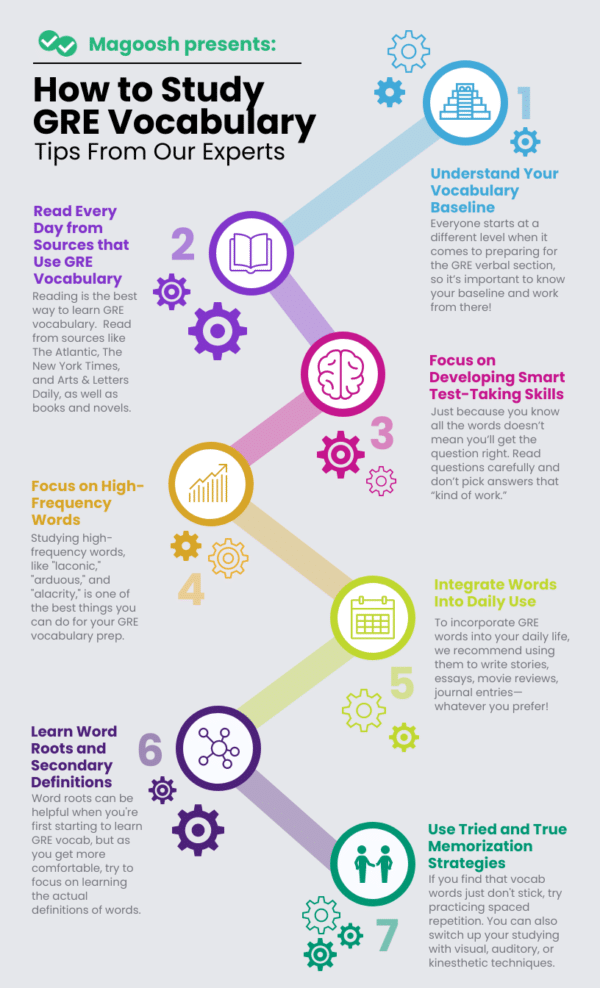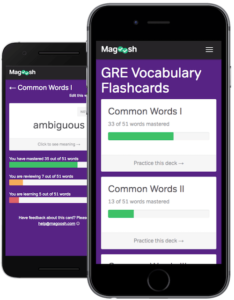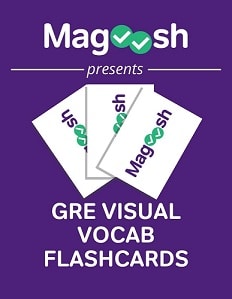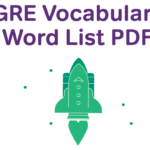The content in this post applies in 2025 to the new, shorter GRE!

When studying for GRE Verbal, students often ask me how best to make GRE vocabulary stick. Folks may spend a ton of time on flashcards, vocab builder apps, and word lists to only find that words are not embedded in their memory as firmly as they would like. Well, my friends, therein lies the biggest mistake: if vocab is not your strongest suit, you simply cannot expect to rely on rote or passive memorization and expect to remember enough GRE vocab to do well on test day.
So what should you do instead? This article has you covered! By the time you finish, you will:
- Get a sense of how much vocab you need to study to get a high score on GRE Verbal
- Know what to avoid when it comes to studying GRE vocabulary
- Read directly from students what worked for them
- Get access to a treasure trove of free resources and tips
- Learn how to make your GRE vocabulary prep fun AND effective!
Table of Contents
Below are our tips for how to win at GRE vocab, in order of importance:
- How to Study GRE Vocabulary (Infographic)
- Understand Your Vocabulary Baseline (with Bonus Quiz!)
- Read Every Day from Sources that Use GRE Vocabulary
- Focus on Developing Smart Test-Taking Skills
- Focus on High-Frequency Words
- Integrate Words into Daily Use
- Use Tried and True Memorization Strategies
- Learn Word Roots and Secondary Definitions

Understand Your Vocabulary Baseline
Everyone starts at a different level when it comes to preparing for the GRE verbal section, so it’s important to get a sense of what your baseline GRE vocabulary is and about how many words you should expect to learn. For instance:
- If you’re a voracious reader (and you know what “voracious” means along with words like “litigate” or “reprimand”) but you may not know words like “solicitude,” “impecunious,” and “parsimonious,” learning about 1,000 words should prepare you to do well on test day.
- If you’re a voracious reader and you knew what all of those words above meant, then learning only a couple hundred more words might help you snag a perfect verbal score.
- If reading is not your strong suit and you aren’t familiar with many of the above words, then you might have to learn more than a 1,000 words.
Read Every Day from Sources that Use GRE Vocabulary
There are no cutting corners here: reading is the best way to learn GRE vocabulary.
The GRE, for the most part, doesn’t just throw random, obscure words at you. These are words that show up in news and opinion sources like The Atlantic, The New York Times, and Arts & Letters Daily as well as certain books and novels. Frequently reading from sources that are replete in GRE vocab does not only help you internalize these words and their definitions, but it is also the best way to see these words in context—and “words in context” is exactly how the GRE tests you on vocab.
Reading also helps by reinforcing words that you kind of know and by helping you learn new words that you can always double-check GRE lists for (this is a pretty good way to determine how worthwhile it is to learn a word). Reading also helps break up the monotony of flashcards. Whether you have a month or a couple of months to improve your vocabulary, make sure you take time to read daily from GRE-friendly resources.
- Resource Alert! Reading Sources Filled with GRE Vocab
Check out article and book recommendations:- GRE Vocabulary Books: Recommended Fiction and Non-fiction
- GRE Reading Comprehension Practice: The New York Times, The Atlantic, The New Yorker, and More!
Also, the search function on nytimes.com makes it easy to search for articles containing certain words; other sites may be similar as well.Finally, our post on GRE Word Lists also recommends some sites where you can search for a given word and find articles and sentences that use the word.
Focus on High-Frequency Words

The Magoosh flashcards were more than enough for me. I always used them on my phone while I was commuting to work. – Hemanshu
The GRE plays favorites with words. Although it’s hard to predict exactly what the pool of words the test draws from is, studying high-frequency words, like “laconic,” “arduous,” and “alacrity,” is one of the best things you can do for your GRE vocabulary prep.
If you use Magoosh’s GRE Vocabulary Flashcards and Vocabulary Builder App along with these other strategies, you will likely be prepared for at least 80% of the words you encounter on the GRE. (If you learn 500 more words, you’d be closer to 90%.)
Focus on Developing Smart Test-Taking Skills

When you do practice questions, don’t just look up the word that was the right answer on a question you missed, look up all the words on each question and try to change the question to make the word fit. – Katie
It’s important to note that many GRE vocab questions are created with carefully selected traps. Just because you know all the words doesn’t mean you’ll get the question right. Read the questions carefully and don’t pick answer choices that “kind of work.” I often tell students that developing these skills is just as important as learning words. This is why reading regularly and having a deep understanding of how words are used in context is super important, in addition to actively engaging with practice questions (for more on that, check out our post on how to avoid GRE score plateau).
Smart test-taking skills can often also be more helpful than learning an additional 2,000 words, many of which will be somewhat obscure. For example, one official question has “recrudesce” as one of the answers. This word is very unlikely to show up on any lists, but you can still identify whether or not it is the correct answer choice via the process of elimination.
Integrate Words Into Daily Use
I made Facebook posts using the new words I used. I would let your friends know that you are studying for the GRE, maybe even get them in on it- ask them to come up with their funniest sentences. When I wrote my statuses, I made mention of the GRE, either directly or via a hashtag. #GREvocab could work. – Davie

Using GRE words in your day-to-day communications is much better than rote memorization, but you should be very careful how and when you try to use GRE vocabulary. Friends and family who are given ample warning as to what you are doing seem fair game, but randomly dropping them in conversations is not going to come off well and will likely smack of pretentiousness.
I don’t recommend using GRE words in professional contexts, whether in an email or meetings. First, there’s the risk that you may use the word incorrectly and would be no good for your image. And even if you correctly using a word, how that is received can go wrong in several ways. Will the person think you are trying to sound smart? Will they have to look up the word and then feel insecure that they had to? Will they think you are trying to one-up them? The list goes on, and it doesn’t look good!
(Although one student—who preferred to remain anonymous and for good reason!—said that using GRE words in conversations with snobby people, like her boss or her mom’s book club friends, was the “most helpful thing [she] did, in conjunction with flashcards!“)
I think a better method is to write stories, essays, movie reviews, journal entries—whatever it is that motivates you to write—that incorporate these words. You don’t have to show these to anyone, but people would probably be more okay with seeing GRE vocab in a blog post than in an informal conversation.
To help you make sure that you’re using GRE vocabulary correctly, check out our post on commonly confused words and definitions on the GRE.
Memorize Words Using Different Strategies
When you’re studying from flashcards and word lists and find that words still aren’t sticking, the first thing you should consider is spaced repetition. This is an evidence-based learning technique in which you review the material over and over again while increasing the time between each review. If you cram GRE words the night before the test, chances are you won’t remember most of them a week after the test, if not during the test. But if you review the words you struggle with the most a day after reviewing them, then three days later, a week later, etc., you’ll be able to encode them in your long-term memory.
Flashcard apps like Anki use a spaced-repetition algorithm. They’ll show you all cards in the deck with increasing intervals in between, but they’ll show you words that you are stuck on more frequently and words that are easy for you less frequently. Spaced repetition works best if you have more than a month to study, but should also help you in less time (meaning you should resist the urge to review words every day if you want to encode them in your long-term memory).
Memorization Strategies Based on Learning Type
In addition to spaced repetition, here are some additional strategies based on learning type that will further help words stick and may also make learning them a more fun process.
Reading/Writing Memorization Strategies

When I was studying for the GRE, to memorize words I would create funny and usually inappropriate sentences with the words to help me remember them…I also made a lot of rhymes and songs as well to help. Usually, the more outrageous and funny they were, the easier they were to remember. I found rhyming helped me a lot. – Maggie
If you learn best by reading and writing, then you should be set with much of the above advice regarding daily reading and integrating GRE words into your writing. Although I don’t recommend this strategy, learning words by perusing GRE word lists might also be easier for you than folks who fare better with other learning strategies. As you peruse GRE word lists, consider writing out vocabulary, definitions, sentences, fun jungles, etc. instead of typing, as writing by hand is linked to increased neural activity.
Visual Memorization Strategies
The human brain processes visual content 60,000 times faster than written content, so you should definitely consider using images to help you with hard-to-learn GRE vocabulary.
- Resource Alert!
We’ve created these flashcards to help you learn GRE vocabulary through image association. Click to access the GRE Visual Vocab Flashcards in printable PDF format!
You might consider drawing your own images associated with GRE vocabulary to switch up your prep. This strategy may be time-consuming, but it’s a great way to combine written and visual learning techniques for even better recall.
Another visual strategy is the mind palace technique. This is a process where you would imagine a vivid and unique visual for each GRE word. This technique is often used by those who participate in memory competitions, in which competitors memorize tons of information in a short amount of time. So it should help with vocabulary recall on the GRE!
Auditory Memorization Strategies

Sam does a good job providing related words and provided examples. Hearing him talk about the words in-depth helps to solidify the memory of them in my mind. It’s especially helpful when you have a full-time job and can’t physically engage with flashcards, etc. – A listener of the VictorPrep GRE vocabulary podcast
If you’re on the hunt for audio resources to help with GRE vocabulary prep, definitely make sure to check out our GRE Vocab Wednesday series on YouTube. For GRE vocabulary podcasts, the VictorPrep podcast and the Tyrannosaurus Prep podcast comes highly reviewed.
Kinesthetic Memorization Strategies
Although not many people are kinesthetic learners, using your body in your GRE vocab prep can be another effective way of internalizing vocabulary. For example, writing out GRE vocabulary is a great example of both a kinesthetic and written practice.
Combine both kinesthetic and visual techniques by labeling things in your house that you can associate with the word. For example, you might consider labeling your stove as “acerbic” to represent the harshness of fire or labeling an abstract work of art in your house as “abstruse” or difficult to understand.
Playing GRE vocabulary charades is another possibility. Although not the most efficient way of studying vocabulary, if you know other people who are studying GRE vocabulary and would be interested in participating, this option is a great way to inject some fun and socializing in your GRE vocab prep and make it feel like less of a chore.
Learn Word Roots and Secondary Definitions
Knowing Latin roots has been the number one most useful thing in my GRE vocab section. – Jin
Word roots can be helpful when you are first starting to learn words, especially if you do not consider yourself strong at vocabulary. Roots can also be helpful to suss out more obscure words and give you an edge for more advanced GRE vocabulary questions. You also want to watch out for how words appear in different parts of speech; being familiar with these different forms of the words can essentially double your vocabulary. Some examples: magnanimous (adj.), magnanimity (n.), magnanimously (adv.); calumny (n) and calumniate (v.).
However, I would be careful with learning roots and use it in addition to learning the actual definitions of GRE vocabulary, rather than replacing roots with definitions. Many words that we consider “GRE vocabulary” do not easily lend themselves to being dissected by common roots. In fact, if you try to do so with a word you are unsure of, you are likely to run into trouble. For instance, “sedentary”—meaning to sit and based on the root “sed”—will not help you parse the meaning of “sedulous”, which means hard-working and comes from a different root (one that doesn’t show up in other words, besides zealous).
Takeaways
Ultimately, the most important thing to remember is that active usage means deeper learning, which translates (usually) to be able to more easily recall words on the spot. By moving away from rote memorization and moving towards daily use of GRE vocab (and using flashcards and word lists as supplementary—not primary—study materials), you’ll see that words will stick before you know it!









Leave a Reply